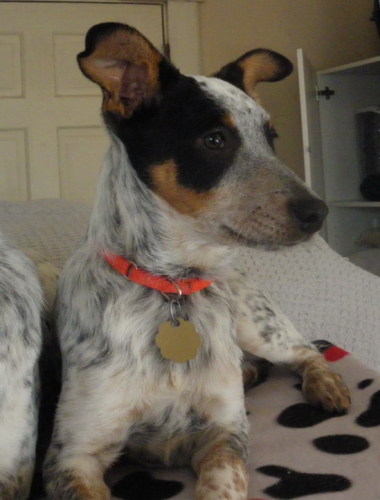Socialization, it’s quality over quantity
Trainers preach (beg and plead may also be appropriate here) the importance of socialization like the gospel. It is one of the first things out of their mouths when talking to people interested in getting a puppy or who have a new puppy. I have seen more and more segments and articles on socialization appear in the mainstream media or more mainstream sources. Even with all of this information I am constantly being inundated with teen and young adult dogs who have been with their families since puppyhood who are very poorly socialized. They are fearful of new situations, have handling issues, are not socialized with other dogs and are often developing issues with strangers. The vast majority of these dogs were simply not socialized enough–they had few experiences outside the home, were not introduced to to appropriate adult dogs or other puppies, and were not exposed to a wide range of people in different situations. There are, however, a growing number of puppies who are getting more than enough socialization but it is not quality socialization. This is a huge issue–bad socialization is worse than no socialization in my opinion.
There are a lot of places where socialization can go wrong. Improperly managed puppy play-time during puppy school can turn a fearful dog into an aggressive dog, can turn a friendly dog into a fearful dog, and can turn a friendly dog into a frustrated/reactive dog. Going to the frat parties that are “dog parks” can seriously scare a puppy and they can be at risk of an adult dog not tolerating their puppy antics and giving an over the top correction (which could in turn start an actual dog fight). Puppies that are “socialized” to people by forcing the puppy to be pet by people that obviously scare them (or that they clearly have no interest in approaching). There is no benefit to taking a puppy everywhere with you, if the puppy is always stressed/scared in these situations. A problem I see more often with small dogs but that definitely plays a role with larger dogs is that, it’s not really socialization if the puppy never sets foot on the ground–what do small dogs learn about the world if they are always carried?
I have seem some really poorly run puppy classes in my day. It’s not just about getting the puppy into puppy school ASAP, but getting them into a good puppy school. I’ve witnessed puppy school where the puppies are routinely alpha-rolled (not just belly rub time), where fearful dogs are dragged out from under chairs into the room, where fearful dogs are handled well beyond their comfort level, and where puppies are forced to interact with scary novel stimuli in the environment. I’ve also seen puppy classes where the puppy play is anything but healthy–bullying behavior is not interrupted (multiple dogs ganging up on a fearful dog), where resource guarding (either items, space, or people) goes on without interruption, where breeds are discriminated against during play (bully breed puppy is in a corner by himself not allowed to play with others although he’s a healthy player), where the arousal level of the dogs is allowed to get to the point where dogs are getting scared and defensive, where fearful dogs are continually harassed by the confident dogs, where 12, 15, or 17 puppies have a free-for-all in a room, and where cut-off signals are completely ignored by other puppies. These types of things happening in puppy school are detrimental to their proper socialization–they aren’t learning good things about the world.
When I see puppies out at pet stores for “socialization” I often see pups who are stressed out, fearful, or overwhelmed. They are being forced into situations that they are trying desperately to avoid (being dragged around a store quite literally). There is no reinforcement or positive happenings from the dog’s perspective (best reinforcement for most of these pups would be removal from the situation since they are so over threshold that they probably wouldn’t take a treat). Some dogs can cope with the environment but struggle with sudden environmental changes or the noises chaos that sometimes accompany pet store visits. Perhaps they are okay in the environment but are being yanked around by a handler trying to prevent the pup from getting all the toys, sniffing/eating chews in low baskets, or from having a potty accident in the store. How many trips where bad things happen to the pup will it take before the pup no longer likes going to the store or starts being stressed? What about the puppies who are practically smothered by adoring strangers who want nothing more than to hug and kiss the puppy as the pup tries to walk away, retreat, or get away–are they learning to enjoy being pet by strangers or learning to dislike them?
Here are my general tips for quality socialization
- Make sure the puppy is respected at all times–watch for body language signals and respect them, if the puppy is uncomfortable, don’t push it
- Make each socialization experience a positive experience–don’t just let the pup experience the stimulus, make the stimulus awesome
- Do not push the puppy to do something in the name of socialization–if your puppy is afraid to greet a person in a hat, do not physically force them, try having people in hats become the source of good things
- Create situations that you have some control over–this may mean socializing with known dogs, in familiar environments (for the person), or with familiar people
- Don’t jump in the deep end before they can swim–don’t go straight for the pet store on a busy saturday afternoon for socialization, start instead with a few friends over your house, or a few friends at a park, or play date at a friend’s home, or maybe a trip to a small local pet store on a weekday morning (not busy time)
- Remember dogs don’t generalize so you want them to experience toddlers, sirens, men in hats, etc in a variety of environments/situations (remember to make each experience positive and pair it with good stuff).
Guardians absolutely need to socialize to a wide range of people, many different places, strange environmental stimuli, a variety of dogs/animals, and new experiences but this doesn’t mean it’s a total free-for-all.
Some specific socialization ideas
- I think socializing with with a variety of dogs of varying ages is important–puppy play is great but learning how to act around adult dogs is just as important if not MORE important since they will be adults much longer than they are puppies. To do this, I suggest plenty of play dates with friends who have sound adult dogs (typically 1 other dog at a time to start but sometimes more if the other dogs all live together or are friends)–don’t feed them to the wolves at a dog park. Pick their playmates (adults and puppies) carefully because those experiences will help shape how they socialize for the rest of their lives. When I have found appropriate play mates, we may go for a walk together, maybe I go to their house, maybe they come to mine (maybe I even bribe them with promises of baked goods), maybe we go to a park together. Sometimes there is off-leash play, sometimes we just hang out, or sometimes we have leashed adventures. I also suggest finding and enrolling in a QUALITY puppy school that has well managed and supervised play sessions broken down into small groups or pairs.
- Learning to be comfortable in a variety of environments is important for dogs coping skills later in life–you’ve got friends right? They’ve got homes right? Taking puppy to friends homes is a great starting place for getting comfortable in new environments–it’s low key but lots of differences (house, apartment, condo) in the environments–new noises, new decorations, new people, new smells, etc. As puppy is gaining confidence going to new places, you can increase the excitement of the environments. Make “fun visits” to the vet office, enroll in a training class at a facility, go to different parks, walk in pedestrian friendly shopping areas (you may even find dog-friendly stores to visit), or visit a pet store (during off-hours to start).
- While visiting your friend’s homes (or they are visiting your home) make sure to visit with friends who have dog-friendly children, visit your grandparents (or see if a friend’s grand parents can come over), visit friends of all shapes, sizes and colors OR invite a few friends over for dinner and puppy time. You can ask friends to put on hats or coats or wigs or tutus or carry bags, purses, canes, or brooms when around the pup (tossing treats while in costume is great without forcing the pup to be pet by the person in costume if they dont’ want). If you live in a neighborhood with kids and you know the parents, you can always ask the parents if they would mind letting their kids help socialize your puppy (I start with kids a little older since they are often better at following rules than toddlers)–I start with a sit-down play time that is pretty low-key for everyone.
- Provide novel stimuli on a regular basis both inside your home and in new environments–open umbrella, boxes, balloons, bubble wrap, scare crows, crutches, swings, bowling pins, astroturf pieces, bricks, rocks, sand, tile flooring, sirens, fireworks noise (start soft), skate boards, bikes, cars, trucks, strollers, etc.
- Pair puppy handling with good stuff–don’t take for granted that puppy tolerates certain handling as a youngster. Start early pairing body handling with food–rub their ear and suddenly peanut butter appears in front of them, rub their feet and suddenly peanut butter appears, check their teeth and peanut butter appears, etc.


Great points! This is so important, and I wish I had heard this message more when we adopted our shy dog. Many people told us just to take her everywhere, even stressful places; I wish we had listened to our instincts and respected her pace of progress more. Thanks for sharing your training wisdom; always appreciated!